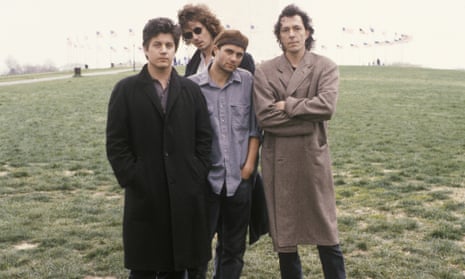Thin White Rope were named after William Burroughs’s description of ejaculating semen in The Naked Lunch – and that’s not even the best thing about them. The opening song on their first record, Exploring the Axis, set out the sonic and emotional terrain the band examined between 1985 and 1992. “Something affected him down in the desert,” sang Guy Kyser, ominously, over a fried, looping Tex-Mex groove. Thin White Rope conjured up intense heat and shimmering mirage. Everything felt scorched, alien and hostile. I’m guessing they took a lot of acid.
The band, hailing from California, revolved around singer/songwriter/guitarist Kyser and lead guitarist Roger Kunkel. Back in the day, a sceptical friend dismissed them as “metal”, perhaps the ultimate insult in those indier-than-thou times. They weren’t, though I’m still not really sure what they were. Their five albums roamed over desert rock, warped psychedelia, fucked-up country, jangle-pop, lysergic blues. They covered Hendrix, Can, Duke Ellington, the Byrds (their version of Everybody’s Been Burned is wonderful), Hawkwind, Lee Hazlewood and Marty Robbins, and somehow made them all burn and howl.
Thin White Rope often made a slightly terrifying sound, but it was beautiful, too. Kyser wrote fantastic melodies, and while his charred voice could out-Beefheart Beefheart, it also possessed a quavering tenderness. Their use of twin guitars was as thrilling and distinctive as anything Thin Lizzy or Television achieved with 12 strings: coiling, concentric lines, overloaded and unfailingly malevolent, with brutally deployed and expertly controlled feedback. They were kind of funny, as well, though it’s impossible to explain why.
I saw them play live only once, driving with friends from Bristol to the Joiners Arms in Southampton in the early 90s. They were supported by the British post-grunge band Midway Still, which we guessed was somebody’s idea of a joke. We pitched up to find Kyser standing outside, drinking a bottle of beer and wearing a leather waistcoat, bare-chested underneath, a look last sported by Bono on Rattle and Hum. I couldn’t have been more thrilled. Later on stage, he sang as though his insides were clogged by some mighty existential furball and he was trying to cough it out song by song.
Thin White Rope got a fair bit of love from the music press, and I did my modest bit to help spread the word. Our callow teen band would perform their song Thing to unsuspecting drinkers in the local pub (we reasoned that it was a pretty country gambol through summer heartache, accessible to all; the horrified bar owner demanded we “play a fucking fast one”). It was a doomed mission. Though they were latterly scooped up by a major label, Thin White Rope proved much too idiosyncratic to join the ranks of US breakout alternative bands – REM, the Replacements, American Music Club, Pixies – and split up in the early 90s. Last I heard, Kyser had formed some kind of demonic bluegrass band, which is a pleasing thought.
Moonhead and In the Spanish Cave remain remarkable albums, the finest examples of the band’s ability to capture and sustain a mood of roiling, heat-stroked intensity. Later albums Sack Full of Silver (which boasts a ferocious cover of Can’s Yoo Doo Right) and The Ruby Sea are a little patchier, but still mighty.
Listening back to these records, as I do regularly, it’s not difficult to discern why Thin White Rope never transcended cult status. On The Ruby Sea there’s a track called Puppet Dog, about a man who masturbates himself with a glove puppet. Moonhead ends with Crawl Piss Freeze, not so much a song as an apocalyptic death march. This was a band who singularly lacked the knack or desire to tweak their eccentricities. Thin White Rope belonged to the desert and there they stayed. In my mid-teens I thought they were the greatest thing I’d ever heard, and 25 years later I’m not at all sure I was wrong.

Comments (…)
Sign in or create your Guardian account to join the discussion